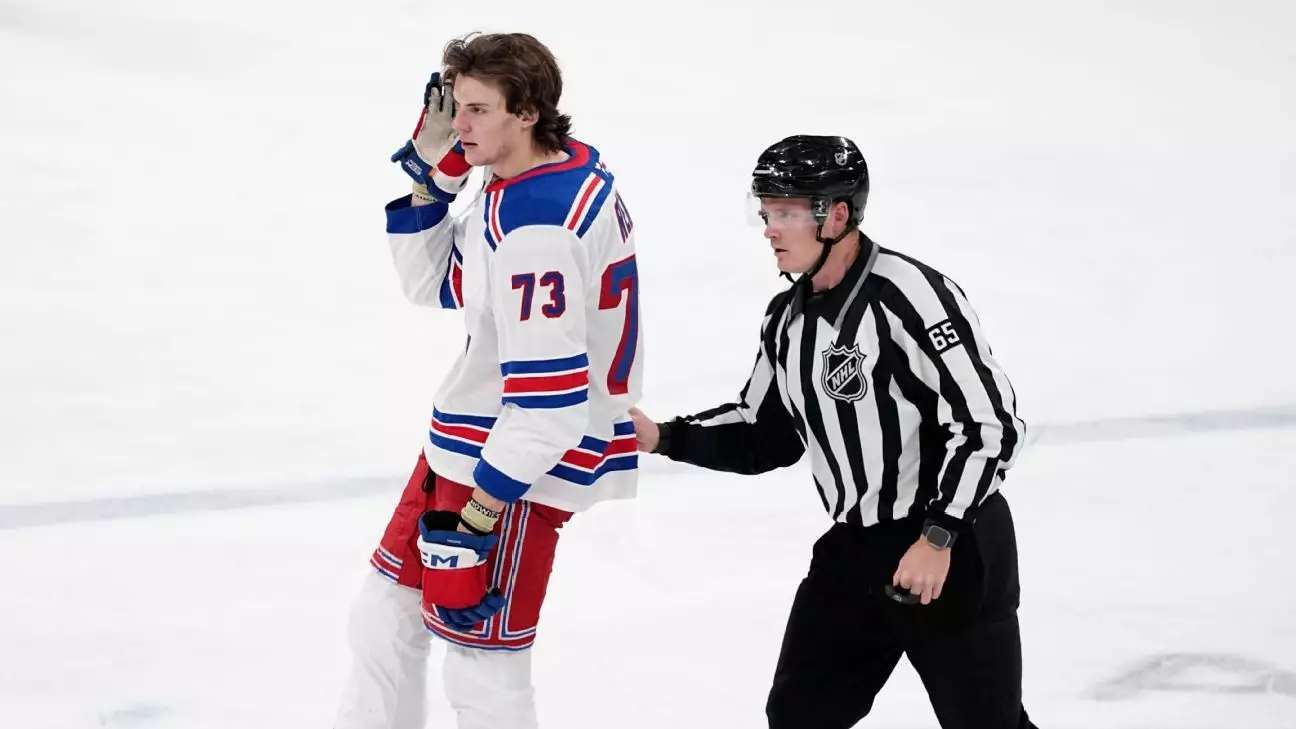The National Hockey League (NHL) has a long history of dealing with on-ice discipline, and the recent suspension of New York Rangers forward Matt Rempe for eight games has highlighted issues surrounding player safety and the repercussions of aggressive play. This incident not only raises questions about the enforcement of NHL rules but also stresses the fine line players must walk between physicality and legality within the game.
The incident occurred during a matchup against the Dallas Stars, where Rempe executed a hit on defenseman Miro Heiskanen that was deemed dangerous and illegal. The NHL’s Department of Player Safety categorized the hit as a violation of both boarding and elbowing rules, which speaks volumes about the severity of the act. While Heiskanen managed to finish the game, what should be concerning is the methodology of checking and tackling players, particularly those in vulnerable positions.
As noted in the NHL’s findings, the scrutiny fell on Rempe’s actions leading up to the hit. It was deemed that he had ample opportunity to recognize Heiskanen’s defenseless position and adjust his approach. The league’s focus on player safety is crucial; however, it can sometimes lead to ambiguity in defining the acceptable limits of aggressive play. This incident could serve as a vital case study for how the NHL interprets aggressive tactics, given its mixtures of traditional hockey’s physicality with modern safety concerns.
The Consequences: Suspension and Financial Impact
For Rempe, the consequences of this suspension are profound. Not only will he miss eight critical games, halting any momentum he may have built with the Rangers, but he will also incur financial losses estimated around $80,000. This amount will be contributed to the Players’ Emergency Assistance Fund, underlining that the league takes such infractions seriously and aims to redistribute financial penalties towards the welfare of players in need.
The implications of being a repeat offender are also significant. Having received a four-game suspension last season for a similar elbowing incident, Rempe’s latest infraction has compounded the weight of his previous actions on his current situation. For the NHL, the rule that dictates harsher penalties for repeated violations aims to deter aggressive behaviors, but it places additional pressure on the player, who now faces scrutiny not only from the league but also from the fans and his teammates.
Interestingly, Rempe has the option to appeal the suspension to NHL Commissioner Gary Bettman. Additionally, because the suspension exceeds six games, he can escalate the appeal to a neutral arbitrator, which introduces a fascinating layer of possible negotiations and outcomes. Appeals can often lead to reduced suspensions, but they also force players like Rempe to grapple with the realities of being labeled a repeat offender while in the limelight.
The dynamics of such appeals are complex. While they offer a pathway to potentially lessen penalties, they could backfire, amplifying public and media scrutiny of the player’s previous conduct. The optics of being suspended yet again could push Rempe further into a corner as he balances the desire to be a physically impactful player with the necessity of adhering to league standards.
From a team perspective, the suspension is a sizable loss for the Rangers, who are navigating a competitive NHL landscape. Coach Peter Laviolette previously praised Rempe’s energy and impact during games, emphasizing how his physical presence could rally the team. However, with his absence, the Rangers must find a way to fill the void left by Rempe’s size and aggression.
The team must also consider how this incident affects their locker room culture. Players often rally around a mentality of toughness, but repeated suspensions can cause whispers of uncertainty. Will Rempe’s teammates feel encouraged to play physical or will they be more cautious in their approach? The team dynamics could shift significantly as young players begin to adjust to the expectations set both by the coaching staff and the disciplinary actions of the league.
Matt Rempe’s suspension serves as a microcosm of the ongoing debate about physicality in hockey and the balance between player safety and aggressive tactics. His case provides a good opportunity for dialogue pertaining to rule enforcement and the responsibilities of players within this evolution of the sport. As defensemen and forwards alike continue to navigate the ever-changing landscape of the NHL, incidents like these underscore the importance of mindful play and adherence to the league’s standards.

